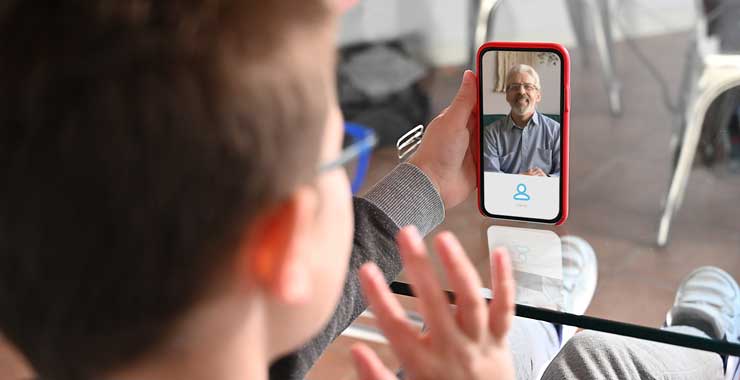Technology and Counseling: Now to 2030!
The world has rapidly moved towards the digital delivery of mental health services as our ‘new normal.’ While this shift has been ongoing for several years, the COVID-19 pandemic has been the largest impetus for this shift. This pandemic has presented health care professionals with copious levels of challenges. While the focus has been mostly on physical care, there has been another silent health problem occurring. This problem did not receive the same media attention. At least not initially. This problem was not quantifiable using medical imaging, nor did it share the same symptoms as COVID-19. Nevertheless, it is a consequential national health emergency. Chi Sigma Iota, CACREP and counselors across the country understand and have experienced this challenge. It is in our duty of care to make the necessary adjustments to address it head on.
This emergency was the deterioration of the mental health for millions of Americans. This mental health crisis is now widely seen and empirically verified. Like the overcrowded emergency rooms, the need for mental health counseling services has outpaced the current infrastructure for these services to be delivered adequately. The deleterious effects of isolation and the exposure and experience of physical stress and illness have taken their toll on individuals of all ages. Added to this has been the financial stressors of placing businesses and careers on hold.
With the need for counseling services of Americans at an all-time high, there was yet another obstacle to treating mental health. The physical doors of counseling facilities were shut down. There was no time to adjust client treatment plans or evaluation for effective means of switching to a virtual delivery of counseling sessions. The virus had locked the practice doors to both counselors and clients alike.
The clinical relationship was thrust into what was for many counselors, uncharted territories. The warm, inviting, and personal setting of face-to-face contact between client and counselor disappeared with no return in sight. As Carl Rogers once said, there are four tools that he uses in counseling: the chair, the recorder, a box of tissues and himself. Counselors of today have been called to adapt to using new tools. The chair and the Kleenex box have been exchanged for telehealth platforms and home offices. Counselors have been invited to re-imagine how to demonstrate empathy and even basic body language in a virtual, telehealth setting.
Counselors have also been invited to reimagine collaborative care and how to advocate for their clients virtually. Moreover, counselors have been presented with an opportunity to adapt digital ways to provide wraparound, holistic services to their clients. Electronic medical record platforms and the advancement of digitization of records, has made Release of Information forms easier to be exchanged between the client’s other healthcare providers. As the use of ZOOM, Microsoft Teams, and other digital platforms has expanded, virtual group meetings have replaced the setting in which counselors advocate for their client. The aforementioned situations mark a clear-cut path for counselors to be pioneers and leaders of what collaborative treatment planning looks like in this new telehealth world.
The call for leadership does not end there, however. Unfortunately, this pandemic, and the circumstances of being isolated in the home, highlighted significant technology gaps within our society. Counselors are called to build new bridges to transcend these emerging gaps that have been created by this shift to telehealth counseling services. There is a cry for counselor organizations such as Chi Sigma Iota and CACREP, to advocate at a community and national level, for clients who do not have computers or access to reliable internet connection. A new call for equity has been heard with a need to address these technological disparities. There are many underserved communities, particularly those of African American, Latino, and Indigenous Americans who have very limited access to modern electronic devices and a stable internet connection which are needed for participating in telehealth counseling sessions. Members of these underserved communities have been fundamentally limited from accessing virtual mental health resources in the same way they had limited in-person access. All of this coming at a time when these services were needed the most. For these children and families in need, the physical and digital doors of their counselor’s office have been closed.
While this pandemic has shown light on these alarming inequities, clinical mental health counselors have an opportunity to boldly lead the way for creating new pathways to connect services with these underserved communities. The counseling profession can set the blueprint for what it means to deliver exemplary telehealth services. We are called to reimagine what it means to be of service to others in this new digital world. This involves advocating for our clients to have the resources needed to be able to receive telehealth services. From access to school laptops to local government funded hotspots and other internet services, counselors are called to courageously advocate on their client’s behalf.
We have all faced our own challenges with transitioning to delivering telehealth services. However, now is the time where Chi Sigma Iota, CACREP and counselors from around the country can come together to advocate for equitable access to services for our clients. At the same time, in this united front we can advocate for the counseling profession. Now is the time where clinical mental health counselors can unite from Washington State to Washington D.C. We can shine brightly as a beacon for how to effectively provide collaborative and integrative telehealth counseling. All while fairly and equitably delivering services to those underserved communities throughout our country. Through proactively identifying solutions and adaptations to these challenges, we are creating a pragmatic yet flexible blueprint for the integration of technology into the counseling profession preparing us for 2030!
Call me today at 973-224-8171 for a free intro online counseling (also known as virtual counselling or virtual counselling ) session today! Counseling can help us to create the life we want!
Ryan Joseph Kopyar



